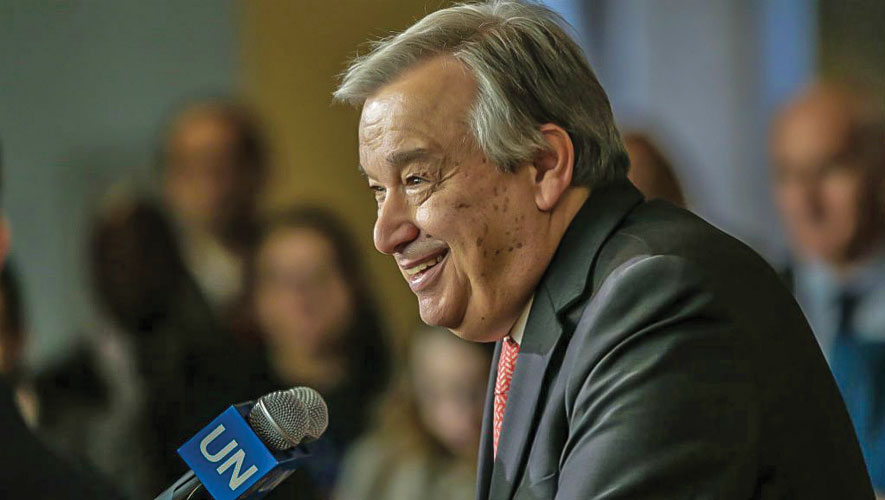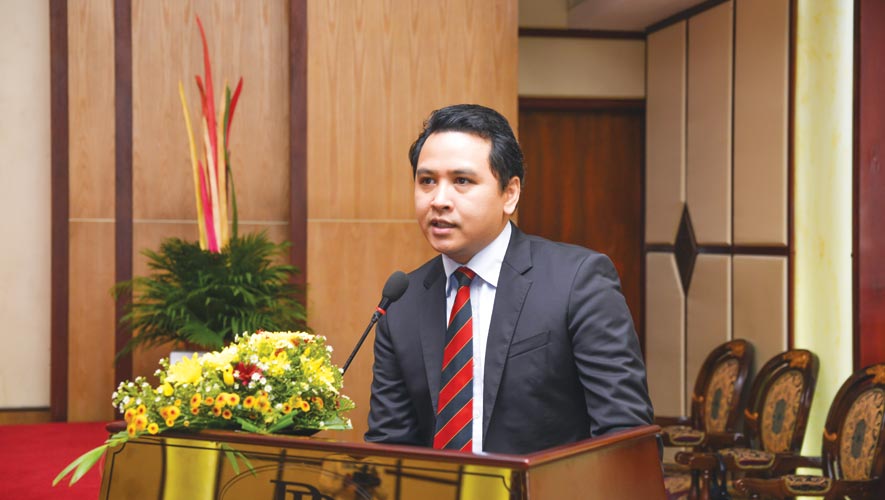Two Cambodians hit with sanctions on US assets
For the latest Cambodian Business news, visit Khmer Times Business
While the removal of Tuesday’s Human Rights Day from Cambodia’s list of public holidays sparked outrage among civil rights activists, international observers and many Cambodians, Monday by contrast passed quietly without any special mention.
Monday, Dec 9, was International Anti-Corruption Day and while the world marched against the scourge of the powerful exploiting the powerless, it was predictably a day of business as usual in Cambodia.
The United Nations estimates that the annual cost of bribery globally amounts to $1 trillion and that $2.6 trillion is stolen annually through corrupt means. The UN Development Programme (UNDP) argues that funds lost to corruption in developing nations are as high as 10 times the level of official development assistance given.
Innovative solutions
“On this International Day, I urge people everywhere to continue to work on innovative solutions to win the battle against corruption and to ensure that precious resources serve the peoples of the world,” stated UN Secretary-General Antonio Guterres, but Cambodia’s efforts on tackling corruption have yielded few results.
In fact, on the same Monday that the world celebrated International Anti-Corruption Day, the US Department of the Treasury’s Office of Foreign Assets Control announced via a news release that two Cambodians have been hit with sanctions on assets owned in the Unite States.
Freeze assets
These sanctions were applied under the Global Magnitsky Human Rights Accountability Act, introduced by then-president Barack Obama in 2016. The Magnitsky Act, as it has become known, allows the US government to freeze assets of foreigners suspected of corruption or abusing human rights and can also bar them from entry into the US.
Oknha Try Pheap, who was accused of being linked to illegal logging in 2018 by activists Global Witness, was named in the announcement on Monday.
‘Timber trafficking’
“For example, Pheap used the Cambodian military to enable his timber trafficking activities and sell to buyers in Vietnam, China, Europe, and Russia. The support of these officials makes it difficult for local authorities to take lawful action against Pheap, as in one example, Cambodian National Park officials were paid by Pheap to keep his operations secret from the international community,” the report read.
Deadly collapse
National Committee Disaster Management First Vice-President Kun Kim stepped down as Chief of Joint Staff of the Cambodian military (RCAF) in 2018, allegedly to run in the 2018 National Elections, but was appointed to his new role this year following the deadly collapse of a construction project in Sihanoukville. This Monday, he too was named as having been sanctioned by the US.
“Kim was a senior general in the RCAF and was instrumental in a development in Koh Kong province and had reaped significant financial benefit from his relationships with a People’s Republic of China (PRC) state-owned entity. Kim used RCAF soldiers to intimidate, demolish and clear-out land sought by the PRC-owned entity. Kun Kim was replaced as RCAF Chief of Staff because Kim had not shared profits from his unlawful businesses with senior Cambodian government officials,” stated the report, which also mentioned that three of Kim’s family – King Chandy, Kim Sophary and Kim Phara – were also designated for sanctions.
Bite of US sanctions
A statement from Cambodia’s Foreign Ministry was reported as stating: “The Executive Order is an ambush against the ongoing efforts to restore trust and confidence between Cambodia and the United States.
This is not the first time that one of Cambodia’s ruling elite has felt the bite of US sanctions. In June last year General Hing Bun Heang – commander of Hun Sen’s bodyguard unit – was accused of involvement in multiple human rights abuses dating back as far as 1999, including a grenade attack on an opposition rally that killed 17 and injured 150. The majority of incidents cited by the US Treasury involved attacks on unarmed lawmakers.
It is worth noting that, coincidentally on December 9th 2019, the European Union broke ground on a similar law to the US’s Magnitsky Act.
“We have agreed to launch the preparatory work for a global sanctions regime to address serious human rights violations, which will be the European Union equivalent of the so-called Magnitsky Act of the United States,” says Josep Borrell, chief diplomat of the EU, who added that this would be a tangible step to reaffirming the EU’s leading role in protecting human rights.
Bribery risk
The World Audit 2015 Corruption Rankings anointed Cambodia as the most corrupt nation in Southeast Asia – no small feat by anyone’s stretch of the imagination. Globally, the Kingdom was ranked 133rd out of 150.
The following year, in 2016, TRACE International – an organisation committed to studying bribery globally, ranked Cambodia as the fifth most at risk country in the world when it came to bribery in business. Flash forward to 2019 and TRACE International’s 2019 Bribery Risk Matrix saw Cambodia move up just one place in business bribery risk measurements, although the Kingdom’s overall score went from 92/100 in 2016, with 100 being the most susceptible to bribery, to 79/100 in 2019.
This year TRACE ranks Cambodia as the 48th worst country for bribery out of 51 Asian nations. Laos PDR, Vietnam and Thailand scored 75, 65 and 48 respectively, compared with Cambodia’s 79.
Failed to improve
In three years, Cambodia has improved marginally, from being ranked 195th in 2016 to 189th in 2019.
TRACE’s Matrix analyses four key areas using data gathered from a wide range of sources including the UN, the World Bank, the World Economic Forum, Freedom House, Reporters without Borders and the World Justice Project.
Over the course of three years, Cambodia failed to improve in the area of business interactions with government, scoring 92/100 in both 2016 and 2019 – the lower the score, the lower the expectation of bribery in business interactions involving the government.
Rising transparency
While some areas had improved according to TRACE – areas such as government and civil service transparency and the capacity for civil society oversight, receiving a poor score in each “based on poor governmental transparency and very poor transparency of financial interests” and “a low degree of media freedom/quality and a low degree of civil society engagement”.
These improvements saw government and civil service transparency shift from 93/100 in 2016 to 80/100 in 2016, whereas the capacity for civil society oversight downgraded from 80/100 to 63/100 over the same period.
Lack of progress
Sadly, Cambodia actually performed worse in the area of anti-bribery deterrence and enforcement, going from 60/100 to 68/100 – suggesting that Cambodia’s ability to respond to bribery and corruption is weakening.
“Based on our data, there appear to be several factors contributing to Cambodia’s lack of progress in anti-corruption,” explains TRACE International president Alexandra Wrage.
“First, substantial regulatory burdens give public officials considerable leverage in extorting bribes and otherwise abusing the system.
Poor enforcement
“Second, Cambodia’s weak anti-bribery enforcement apparatus means it has limited ability to curb corruption. Finally, the lack of governmental transparency is likely impeding significant action by the press and civil society,” says Wrage, adding that while Cambodia has gone through the process of enacting anti-corruption laws, there is little enforcement of these laws, and so little deterrence for bribe-payers.
Weak prevention
“While the country has moved to a market economy, it has not engaged in the regulatory streamlining we have seen elsewhere. With widespread opportunity for bribe demands and a weak institutional mechanism to prevent those demands, it isn’t surprising to see the corruption environment remain largely unchanged,” Wrage observes.
This corresponds with the Financial Action Task Force in February this year placing Cambodia on its infamous Grey List, meaning that the Kingdom is internationally regarded as a haven for money-laundering.
Major negative
Speaking with the Khmer Times in February, managing partner of Mekong Strategic Partners spoke presciently on the matter.
“It is not a list that anyone would want to be on. It is clearly a major negative for Cambodia and, in some ways worse than the threat of losing Everything But Arms (EBA) privileges. Most banks here actually have pretty strong anti-money laundering and sanctions controls, mainly because most banks here are part of larger regional banks that enforce such controls. The controls on the casino and property sectors are more problematic,” he was reported as saying.
The deadline for responding to the European Commission’s report on EBA is Dec 12 – from which the EU will have until Feb 12, 2020, to cast a final decision on whether or not labour rights and human rights violations are severe enough to warrant the revocation of the Kingdom’s preferential trading status.
Investigative report
Should they decide the case is there for revoking the EBA deal, the implementation of this will take six months, with Aug 2020 posed to damage the Cambodian economy should crisis not be averted.
An investigative report from the media agency Reuters recently shone an uncomfortably bright light on the wealth of Cambodia’s ruling elites.
“Family members and key police, business and political associates have overseas assets worth tens of millions of dollars, and have used their wealth to buy foreign citizenship,” it read, before going into immense detail about the nature of those assets and the controversial citizenship acquisition scheme in Cyprus.
The words of Transparency International still ring true from 2014.
“Despite a relatively good anti-corruption law that came into full force in 2011, its implementation has been weak and corrupt entities continue to function with impunity.”
There is little evidence to suggest Cambodia will be sincerely celebrating come Dec 9, 2020.




